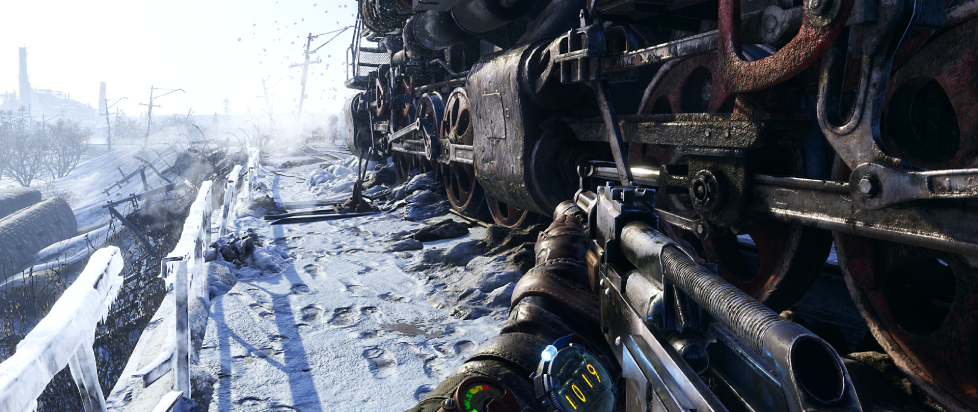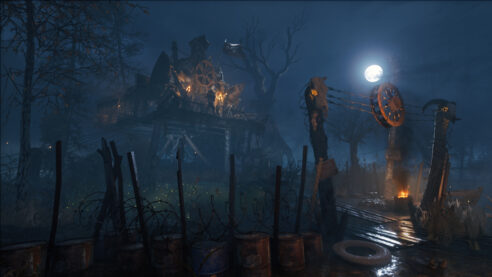
Metro: Exodus and Learning a Lesson Too Late
I adored what I saw of the combat in Metro Exodus, but it was scant-seen. Instead of running around like some Russian Rambo, I assumed a far less lethal approach. I stalked through the shadows, knocking enemies out one at a time, and if a careless stumble were ever to foil this bloodless waltz, I would reload to an earlier save. I made a meticulous effort to avoid all needless bloodshed.
It was a method alien to me and one exclusive to Exodus. Albeit, the first two entries lent themselves more to stealth, with their locations often enclosed and ill-lit, but what elicited this method was the same cation shift that made it more tedious to observe.
Before Exodus, the world Metro had shown me was no more than a rotting carcass. Great towers that once stood as a testament to human achievement are now nothing more than agonizing reminders of what once was. A crown of defeat, our kind cower beneath; we hide like rats while demons roam at their leisure.
As much as this evokes a sense of sorrow, that sorrow is tainted with a hint of shame. We created this hell, and we continue to advance our damnation. Our constant use of violence led us here, and here it will continue.
We have an inherent taste for it. Our motivations are varied, some virtuous, some heinous, and most somewhere in between, but our allure toward it unites us all in a march toward destruction. It isn’t that violence has no use, but our natural inclination toward it causes what should be a last resort to become the first reaction to conflict and confusion.
Metro, in turn, drives us to use restraint. Violence can be used as a tool, but never with ease and never out of ease. It should never be a doubtless decision made without deliberation. And since violence will often lead to more violence, if afforded the chance to avoid it we must do so without reluctance.
It’s a noble direction. Nevertheless, it is one I couldn’t heed, at least not in the first two entries. It wasn’t that I didn’t attempt compliance, but never to the extent sufficient to achieve the alternate end of Metro 2033 nor the canonical conclusion of Last Light.
I harbored no desire to hasten to the decomposition of Moscow, but the hopelessness of it dissuaded me from making much more than a feeble effort to avoid it.
It was a hostile and relentless world with all semblance of strength left in the control of those who failed to understand the lesson Moscow served. Individual redemption could still be obtained, but that was a small solace.

And even the distant promise of outside intervention from the Dark Ones couldn’t overshadow what seemed to be our kind’s unavoidable fate to fall victim to ourselves long before some unfathomable force could arrive to aid us.
I was convinced that if we remained confined to this hell, there would be no future for us, and this sentiment led me to a desire to flee from it, a desire that was as strong as it was fleeting. I had assumed it was a nonsensical dream. Moscow was all that remained of the habitable world, and I found no reason to waste time entertaining such an unattainable notion.
But as I started Exodus, that old desire resurfaced to confront me. I hadn’t felt it was a worthwhile dream to amuse, but that wasn’t a view Exodus shared. It was a central focus in Exodus, and with it came the revaluation of it as a dream that could ever come to fruition.
Exodus commences with a desperate search for that dream, a search that concludes with a revelation. Moscow had been hidden from the outside world, an outside world that, unbeknownst to those within Moscow, still lives on. All orchestrated at the hands of some secretive organization, radio calls can’t come in or out, and all the unfortunate who happen to stumble into Moscow from elsewhere are executed before word of their arrival can circulate.
It was news that Exodus wouldn’t allow us much time to mull. As soon as this revelation was unveiled, we were swept out of Moscow and toward new and unknown territories. But this is far from criticism. All the confusion I had would be cleared up in time, and I knew I would receive the answers I needed, but for now, all I wanted to do was take a much-needed breath of fresh air.
A breath of fresh air that livened me with an unfamiliar sense of hope. It seemed we now had room to flourish without the fear of being crushed between the almost unlivable environment of Moscow and the violent factions that wield control within it. It’s still a world filled with threats and hazards to contend with, but at least the word now meant more than a collapsing hell in definition.
But as I basked in this sensation, a certain dread started to overwhelm me. What future harm I did wouldn’t feel tantamount to kicking a rotting carcass, as It once did. It could all still be hopeless in the end, but for the first time, it didn’t feel like it.
So even though I found my chosen approach about as fun as menial labor, I never lost the motivation to adhere to it because I couldn’t bear the idea of losing this newfound chance to the same blunders that created the hell I had just left in the dust.
———
John Anderson spends far too much time thinking about videogames and not nearly enough time playing them.





